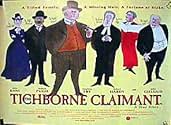Lord Tichborne, the ninth richest nobleman in England, disappears after a South American shipwreck. Some years later, his erudite Afro-English valet, Bogle, is sent to investigate rumors tha... Read allLord Tichborne, the ninth richest nobleman in England, disappears after a South American shipwreck. Some years later, his erudite Afro-English valet, Bogle, is sent to investigate rumors that Tichborne survived and settled in Australia. An alcoholic ruffian answer's Bogle's inqui... Read allLord Tichborne, the ninth richest nobleman in England, disappears after a South American shipwreck. Some years later, his erudite Afro-English valet, Bogle, is sent to investigate rumors that Tichborne survived and settled in Australia. An alcoholic ruffian answer's Bogle's inquiries claiming to be the lost heir. Bogle suspects fraud, but conspires with the claimant t... Read all
- Awards
- 1 nomination total
- Director
- Writer
- All cast & crew
- Production, box office & more at IMDbPro
Featured reviews
This film suggests that the Tichborne affair was as much about the nature of aristocracy as the lure of big money. Orton was not a very prepossessing character, a crude, drunken, overweight boor of a man. The late Roger was not up to much either a failed army officer, also a drunk, who had gone to sea after a cousin had turned down his marriage proposal. Roger's former West Indian valet, Bogle, it is suggested, had a grudge against the Tichborne family and trained up Orton to be an aristocrat for the purposes of deceiving them (in return for half the estates).
Once or twice Orton `remembers'things which are quite extraordinary, but there are huge gaps in his knowledge of Roger and his background. The real Roger was brought up in Paris by his French mother, learned English as a second language in his teens and spoke English with a French accent. Orton tried to account for his ignorance of French by pleading memory loss from an accident (in Tasmania') but clearly the jury did not believe him. Unlike Professor Higgins in `My Fair Lady' Bogle does not succeed in transforming the cloddish Orton into an aristocrat, but the point is made that aristocrats are made, not born, and that the man with the big estate has no particular moral superiority.
Robert Pugh as the claimant puts in a full-blooded, theatrical performance entirely appropriate since he goes on music hall stages drumming up support for his cause during the film. He is supported by a gallery of accomplished players in minor parts Charles Gray and James Villiers as two non-believing family members, Robert Hardy as a sympathetic neighbour, Stephen Fry as Hawkins, the family's barrister, and John Gielgud as Cockburn CJ (who in reality presided only over the criminal trial). The producer Tom McCabe plays Kenealy, Orton's inept and paranoid Irish barrister (who in reality appeared only in the criminal case). The pivotal part of Bogle is coolly portrayed by the South African actor John Kali, a dead ringer for Nelson Mandela. For understandable reasons the scriptwriters have compressed the two trials into one; for completely inexplicable reasons they have changed the dates, moving Roger's disappearance forward to 1866 and the trial to the late 1870s. But the film does at least capture some of the atmosphere, and explain why, sometimes, the more improbable a story, the more likely people are to believe it. One footnote: the firm of solicitors who took Orton's case for him, Norton, Rose & Co, survived the calamity and today flourish as a large and prestigious City firm.
- the voting for this film that is. I agree that it is an interesting, if somewhat slow period drama, but it is intelligent, and well acted and scripted. It's historical accuracy is an added dimension. Worth a look but probably not worth shelling out much money for. My vote 7/10
Who do we blame - The director David Yates or the producer Tom McCabe ? I looked up Yates resume and though much of his work has been in television he has a fairly good track record and will be directing the next Harry Potter film so that must mean something while McCabe has a very uneven CV which nearly always involves his produced works failing to get wide distribution so I'm making a very educated guess that Mr McCabe is the one responsible for this film being virtually unknown
The problem starts round about the opening sequence where Andrew Bogle relates the story of Lord Tichborne through a series of photographs and a not convincing model shot of a shipwreck . This expositional story telling technique has been done many times via the BBC's excellent history show TIMEWATCH and umpteen documentaries on the history channel and all through the running time of THE TICHBORNE CLAIMENT I never got the feeling that I was watching a dramatised cinematic account but something from The History Channel
What makes this rather unforgivable is the potential of the story and the fine cast . People love hearing about other people being made fools of and it's part of human nature but at no point will the audience rub their hands in sadistic glee watching people getting ripped off ( GREY OWL also suffers from this by being overly serious ) and the cast certainly don't help by being very staid . The whole movie would have been much more better if it had a Dickensian caricature feel where the characters are portrayed as Great British eccentrics . As it stands THE TICHBORNE CLAIMENT is instantly forgettable and ever so wasted as a cinematic film
Did you know
- TriviaThe last movie of James Villiers (Uncle Henry) and Charles Gray (Arundell).
Details
- Release date
- Country of origin
- Language
- Also known as
- Tichbornes arv
- Filming locations
- Production companies
- See more company credits at IMDbPro
Contribute to this page


























